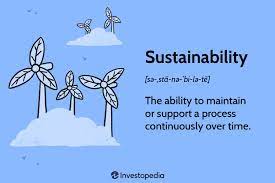The Importance of Sustainability in Today’s World
In recent years, the concept of sustainability has gained significant attention as societies around the world grapple with environmental challenges. Sustainability, at its core, is about meeting the needs of the present without compromising the ability of future generations to meet their own needs.
One of the key aspects of sustainability is environmental conservation. With issues such as climate change, deforestation, and pollution becoming increasingly urgent, it is essential for individuals and organizations to adopt sustainable practices that minimize harm to the planet. This includes reducing carbon emissions, preserving natural habitats, and promoting renewable energy sources.
But sustainability goes beyond just environmental concerns. It also encompasses social and economic dimensions. Sustainable development aims to create a balance between economic growth, social equity, and environmental protection. By considering the long-term impacts of our actions on both people and the planet, we can work towards a more sustainable future for all.
Businesses play a crucial role in promoting sustainability. Many companies are now incorporating sustainable practices into their operations, from sourcing eco-friendly materials to implementing energy-efficient technologies. Consumers are also increasingly demanding products and services that align with their values of sustainability and ethical responsibility.
Individual actions can also make a difference in promoting sustainability. Simple changes in lifestyle choices, such as reducing waste, conserving water, and supporting local farmers, can contribute to a more sustainable world. Education and awareness are key in empowering individuals to make informed decisions that benefit both themselves and the planet.
In conclusion, sustainability is not just a trend; it is a necessity for ensuring a thriving future for generations to come. By embracing sustainable practices at all levels – personal, organizational, and societal – we can work together to create a more resilient and harmonious world for all living beings.
7 Essential Tips for Embracing Sustainability in Everyday Life
- Reduce, reuse, and recycle to minimize waste
- Conserve energy by turning off lights and electronics when not in use
- Choose reusable products over single-use items
- Support local and sustainable businesses
- Plant trees and create green spaces to help offset carbon emissions
- Use public transportation, carpool, walk, or bike to reduce your carbon footprint
- Educate yourself and others about the importance of sustainability
Reduce, reuse, and recycle to minimize waste
By following the principle of “reduce, reuse, and recycle,” individuals and organizations can significantly minimize waste and contribute to sustainability efforts. Reducing consumption helps lower the overall demand for resources, while reusing items extends their lifespan and reduces the need for new products. Recycling materials ensures that valuable resources are repurposed rather than ending up in landfills. Embracing these practices not only conserves natural resources but also reduces pollution and energy consumption, making a positive impact on the environment for present and future generations.
Conserve energy by turning off lights and electronics when not in use
Conserving energy by turning off lights and electronics when not in use is a simple yet effective way to promote sustainability in our daily lives. By being mindful of our energy consumption habits, we can reduce unnecessary electricity usage and lower our carbon footprint. This small action not only helps to save energy and reduce utility bills but also contributes to the larger goal of protecting the environment and preserving valuable resources for future generations.
Choose reusable products over single-use items
Opting for reusable products over single-use items is a simple yet impactful way to promote sustainability in our daily lives. By investing in reusable alternatives such as water bottles, shopping bags, and food containers, we can significantly reduce the amount of waste generated and lessen our environmental footprint. Making this conscious choice not only helps in conserving resources but also contributes to mitigating pollution and protecting our planet for future generations. Embracing reusability is a small step that collectively leads to a big positive impact on the environment.
Support local and sustainable businesses
Supporting local and sustainable businesses is a powerful way to promote sustainability in our communities. By choosing to buy from local businesses that prioritize eco-friendly practices and ethical sourcing, we not only reduce the carbon footprint associated with transportation but also support the local economy. These businesses often contribute to the preservation of natural resources, promote fair labor practices, and foster a sense of community connection. By making conscious decisions to support such enterprises, we can play a significant role in building a more sustainable and resilient society for the future.
Plant trees and create green spaces to help offset carbon emissions
Planting trees and creating green spaces are powerful ways to contribute to sustainability by offsetting carbon emissions. Trees absorb carbon dioxide from the atmosphere during photosynthesis, helping to reduce the greenhouse effect and combat climate change. By increasing the number of trees and green areas in urban and rural environments, we not only enhance biodiversity but also improve air quality and create more pleasant surroundings for communities. This simple yet impactful action can have long-lasting benefits for the environment and future generations.
Use public transportation, carpool, walk, or bike to reduce your carbon footprint
By utilizing public transportation, carpooling, walking, or biking as alternative modes of transportation, individuals can significantly reduce their carbon footprint. These sustainable choices not only help decrease greenhouse gas emissions but also promote healthier lifestyles and reduce traffic congestion. Embracing eco-friendly transportation options is a simple yet impactful way for individuals to contribute to a more sustainable environment and create a positive impact on the planet for future generations.
Educate yourself and others about the importance of sustainability
It is crucial to educate yourself and others about the significance of sustainability. By understanding the principles of sustainability and its impact on the environment, society, and economy, individuals can make informed choices that contribute to a more sustainable future. Sharing this knowledge with others helps raise awareness and inspire collective action towards adopting sustainable practices in daily life and beyond. Education is a powerful tool in fostering a culture of sustainability that can lead to positive change for the planet and future generations.




